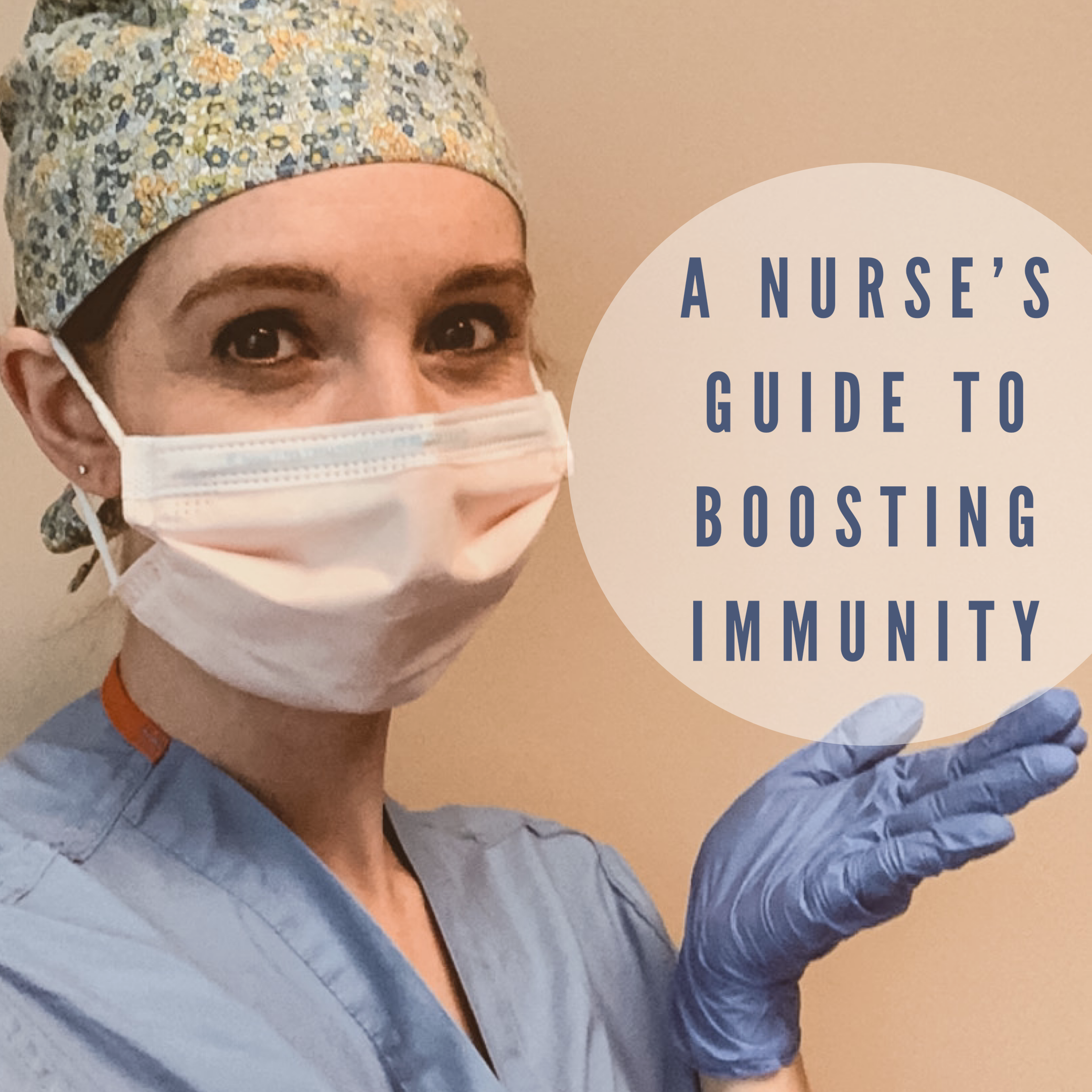A Nurse’s Guide to Boosting Immunity
*This post contains affiliate links #ad
I’m a nurse. And if you’re reading this, you might be too!
Although it’s totally fine if you aren’t a nurse, these strategies apply to humans in general.
Being a nurse is incredibly rewarding, but there are some parts of the job that can impact our immune systems: abnormal sleep patterns, increased stress and cortisol levels, and potential exposure to infectious diseases. It’s important that we’re prepared to take care of ourselves and stay healthy! As a nurse, I’m at risk. But as a patient with Crohn’s disease and on immunosuppressants, I’m at an increased risk. Here’s what I’ve been doing to support my immune system during 2020:
1. Sleep
Sleep plays a HUGE role in maintaining health. According to the Sleep Foundation, your body produces and releases cytokines during sleep (cytokines are those proteins that target infection and inflammation- maybe you remembered that from nursing school, or maybe you needed to google it like me). I know it can be hard to get your recommended 8 hours of sleep in, especially when you work the night shift or if you flip back and forth between days and nights. In order to support your immune system, practice sleep hygiene and find out what works for you.
Bonus: This is the best sleep mask I’ve tried. It blocks out light so well, I didn’t even need blackout curtains when I worked nights!
A sleeping Anna at the 2019 Emergency Nurses Association (ENA) Conference in Austin, TX. Photography courtesy of a hotel roommate.
2. Stress
When your body is stressed, cortisol is released. High cortisol levels can lead to a bunch of health problems including weight gain, high blood pressure, type 2 diabetes, tiredness/brain fog, and, you guessed it, infections. Practicing “stress mindfulness” is important for nurses- when you learn to recognize how your body responds to stress (the anxious thoughts, the body tension, etc.), you can take action to cope with it. That action can be anything that helps you relax- practicing yoga, meditation, go on a walk, cuddling with your pet, listen to chill music, get a massage, or work on breathing exercises (my favorite kind of exercise). ;)
What’s been helping me with my stress lately? For meditation and quieting my mind, I like to use the Calm app. Here’s my go-to cinnamon roll recipe for stress-baking. I also bought this Bob Ross adult coloring book to try out this winter when we’re all stuck indoors!
3. Exercise
There’s some fascinating research about the connection between exercise and the body’s immune system. A 2017 study showed that even 20 minutes a day of exercise can have a positive impact on the immune system! For me, having a variety of exercise options is important. Some days I’ll put on my roller skates, other days I do a 15-minute resistance band workout. Most days, I take the dog on a walk or a 1-mile run around the neighborhood. If I need to take it easy, I’ll do a video from Yoga with Adriene or The Yoga Collective.
At Nicole Kupchik’s Mexico Nurses Retreat January 2020!
4. Wash Your Hands
Hand hygiene is one of the BEST ways to protect yourself from getting sick! Hands touching objects with germs and then touching the face, nose, eyes, and mouth is an incredibly common way to get pick up infections. Hand sanitizer is great (with at least 60% alcohol according to the CDC), but there are certain germs that hand sanitizers don’t kill. Only soap and water can remove things like norovirus and Clostridioides difficile (the nurses reading this will be cringing at the thought of these).
5. Sanitize Your Nose
One product I’ve been using since March 2020 is Nozin Nasal Sanitizer antiseptic, a powerful nasal sanitation product that‘s been proven to kill 99.99% of germs and works for up to 12 hours to help keep you protected. It also smells delightfully like oranges. The nose is a top spot for germs. If you touch it even after washing your hands, you still risk the spread of infection to yourself and others (for more info, go to Nozin.com).
6. Eat Well & Take your Meds/Vitamins
A healthy immune system is also dependant on diet and nutrition! Get a variety of fruits, vegetables. and other whole foods that will help supply the vitamins and minerals that you need.
Unfortunately, the medications I take for my Crohn’s disease suppresses my immune system, so I can take all the help I can get! I take a multivitamin, turmeric, vitamin D, and biotin (I’ve heard that Zinc and vitamin C help support the body in fighting off bacteria and viruses)!
My 10th infusion of Remicade (Infliximab)!
Okay friends! Those are my tips for you. No-brainers, right? Sometimes it’s those obvious things that are the hardest to incorporate into our lives. But here’s one last friendly reminder: You can’t take care of others if you aren’t taking care of yourself.






